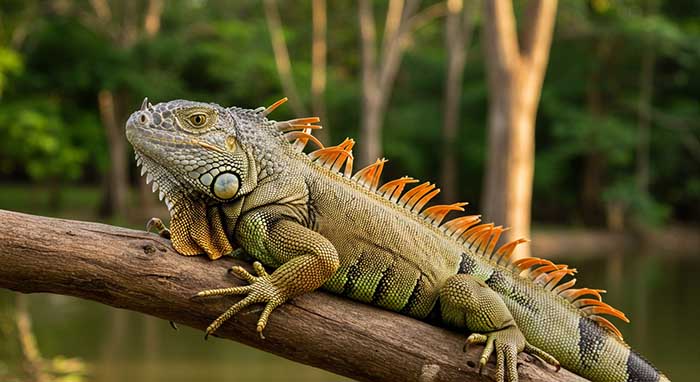Iguanas are fascinating, dinosaur-like reptiles that captivate many exotic pet enthusiasts. However, they often have a reputation for being aloof, aggressive, or difficult to handle. This has led many prospective owners to wonder: can iguanas be friendly? The answer is complex and depends on various factors, including species, environment, socialization, and individual personality.
This expanded guide explores the behavioral traits of iguanas, what friendliness looks like in these reptiles, how to foster trust, and how to create an environment where both pet and owner can thrive in mutual respect.
1. Understanding Iguana Behavior
Iguanas, particularly the green iguana (Iguana iguana), are solitary and territorial reptiles by nature. In the wild, they spend most of their time basking in the sun, foraging for leaves, flowers, and fruit, and remaining vigilant against predators. These instincts follow them into captivity, where they may appear shy, defensive, or aggressive if they feel threatened.
Common behaviors and their meanings:
- Head bobbing: Used for communication, signaling dominance or territorial awareness.
- Tail whipping: A defensive action meant to warn or deter perceived threats.
- Hissing or puffing up: Indicates fear, stress, or discomfort.
- Color changes: Darkening may suggest stress; bright colors can be linked to mating or heat.
Learning to interpret your iguana’s behavior is essential in understanding how to interact with it effectively.
2. Are Iguanas Capable of Bonding?
Although iguanas do not form emotional bonds in the same way mammals do, they can come to recognize their owners and respond positively over time. Iguanas that are consistently and gently handled may become calm, accepting of human presence, and sometimes even appear curious or interactive.
Signs your iguana is becoming more social:
- Remaining calm during handling or petting.
- Eating from your hand or approaching you voluntarily.
- Relaxing in your presence, especially during basking.
Some owners report their iguanas following them, responding to their voice, or displaying unique personalities. While this behavior varies greatly, it highlights the reptile’s ability to learn routines and feel secure in familiar environments.
3. Importance of Socialization and Handling
The earlier an iguana is socialized, the better. Juveniles that are gently handled daily tend to grow into more tolerant adults. However, socialization must always be done at the iguana’s pace.
Steps for effective socialization:
- Start with observation: Spend time near the enclosure so your iguana becomes used to your presence.
- Use feeding as a trust-building tool: Offer treats or food from your hand.
- Begin brief handling sessions: Lift the iguana gently and securely, avoiding sudden movements.
- Talk softly: Your voice and consistency help reduce fear.
Avoid chasing, grabbing, or restraining your iguana forcefully, as these actions can lead to long-term mistrust or fear-based aggression.
4. The Role of Environment in Behavior
A well-maintained and appropriately sized enclosure greatly impacts your iguana’s temperament and health. Stress due to inadequate housing is a common cause of defensive behavior.
Environmental considerations:
- Enclosure size: Adults need a space at least 6 feet long, 6 feet tall, and 3 feet deep.
- Temperature gradients: Maintain basking zones around 95–100°F and cooler areas around 75–80°F.
- UVB lighting: Essential for calcium absorption and bone health.
- Humidity: Should be maintained between 60–80%.
- Enrichment: Add branches, shelves, hides, and foliage to mimic natural conditions.
When an iguana feels secure in its environment, it is more likely to exhibit calm, predictable behavior.
5. Reading Iguana Body Language
Understanding body language is vital to developing a friendly relationship:
- Dewlap extension: May indicate dominance, curiosity, or readiness to communicate.
- Tail twitching: Suggests irritation or an impending defensive action.
- Flattening body or inflating: Signs of defensiveness or feeling threatened.
- Closed eyes while being touched: A sign of tolerance or relaxation.
Careful observation will help you respond appropriately and avoid escalation.
6. Setting Realistic Expectations
While some iguanas grow quite tame and enjoy regular interaction, others remain skittish or prefer minimal handling. Your goal should not be to create a lap reptile, but to foster mutual respect and ensure a low-stress environment for both you and your pet.
Factors affecting personality:
- Sex: Males may become more territorial during breeding season.
- Age: Juveniles are often more adaptable.
- Previous treatment: Iguanas with negative past experiences may take longer to trust.
Accepting your iguana for who it is, rather than forcing certain behaviors, leads to a more rewarding relationship.
7. Time and Patience Are Essential
Iguanas are long-lived reptiles, often surviving 15–20 years in captivity. Building a relationship with one is not something that happens overnight. It requires months or even years of patient, consistent effort.
Long-term trust-building tips:
- Keep routines predictable.
- Approach slowly and from below the line of sight.
- Use treats strategically (e.g., favorite vegetables or fruit).
- Avoid overstimulation; know when to back off.
Document progress and setbacks to better understand what works for your specific iguana.
Iguanas Are Not Pets for Beginners
Iguanas can exhibit friendly behaviors and develop unique, interactive relationships with their caregivers. However, they are not naturally affectionate animals and require time, patience, and environmental consistency to become comfortable with human interaction.
With proper socialization, enrichment, and respectful handling, iguanas can learn to trust and even enjoy being around their owners. They are not beginner pets, but for experienced or committed reptile keepers, iguanas offer a rewarding and educational experience filled with subtle interactions and personality.
Ultimately, friendliness in iguanas is less about cuddles and more about trust, predictability, and shared comfort. Respect their boundaries, and you may find a companion as fascinating as it is prehistoric-looking.

